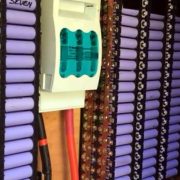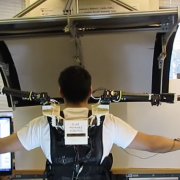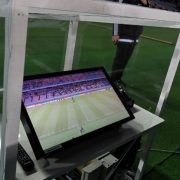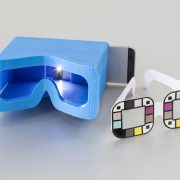Tag Archive for: How To Kill An Hour
UK Woman Can See More Colours?!
/in Gadgets / Tech, Science/by billywrightMost people are trichromats, possessing three types of cone cells to see color with. A woman in northern England has four types of working cone cells, which means she has the ability to see far more colors than most of us can. (Futurism)
Scientists have announced that a woman in the UK has an extra type of cone cell, (the receptor cells that detect colour) in her eyes.
This basically means that, according to estimates, she can see not just 1 colour more than the rest of us, she can see an incredible 99million more colours! She is reportedly amongst a small number of people called ‘tetrachromats’ all of whom have this really cool super-vision. Whilst the rest of us mortals have ‘trichromats’ which means we, normal people have three cells instead of four. Each cell accounting for 100 shades and with all different combinations of each colour, each cell combined means we can only distinguish 1 million different colours. With those who are colour blind only seeing 10,000 different shades because they only have two out of three functioning cone cells.
Star Wars littleBits
/in Gadgets, Gadgets / Tech/by marcusbronzyYou can now build your very own R2 with the littleBits electronic blocks and the companion inventor app, you’ll be able to teach your very own R2 tricks and take on 16+ Missions! The Droid Inventor Kit is very easy to use straight out of the box with initial assembly easy to understand for kids with step by step instructions of both to build their Droid but to control it in Drive, Self-Nav and Force mode.
The littleBits Droid has a ton of features such as:
- 6 Bits and 20 Droid Parts
- 20 Authentic R2 Sounds from the Star Wars universe
- Reconfigure the Droid parts to reconfigure your R2 in a range of different ways and create brand new Droids
- Companion app promotes creativity via a series of challenges and customisation using items around the home
To buy your own Star Wars LittleBits kit please click here!
DIY Powerwalls
/in Gadgets / Tech, Technology/by marcusbronzyThere is a new way to get more power into your home and the people of the internet are going up against Tesla in the world of POWERWALLS!
Apparently a lot and we mean A LOT, of batteries aren’t being recycled, which accounts for a lot of unaccounted for power going to waste. So why not upcycle them and create a powerwall?!
View the video above to see exactly how to get more power from your used batteries, just make sure to follow them to a T and don’t miss anything out, otherwise you could get seriously hurt and or burn your house down!
Footballers Wages: How Long Would It Take?
/in Entertainment/by billywrightFootballers wages are an incredible amount of money and would take the regular person like you or I hundreds of years to earn the amount of money they earn annually. For example Neymar the world’s most expensive footballer earns £775, 477 A WEEK! A WEEK! (Think I need to sit down!)
According to a report by Sporting Intelligence the average wage for a Premier League footballer was £2.4m annually, which is £46k per week, that is more than the average worker in the UK earns in a year! (BBC)
The guys over at BBC sport compiled a handy sporting calculator to figure just how long it would take for us to earn the same amount as your favourite footballing superstars. (Remember, this is without spending a penny to you know, actually live)
Robot Caregivers?
/in Gadgets, Gadgets / Tech/by billywrightElderly people in Japan are dealing with social isolation and loneliness are at an increased risk of ailments, such as cardiovascular disease and elevated blood pressure. It is here where Robots are stepping in to provide company for the aging. They are designed for the elderly who live alone rather than a care facility.
Support robots are springing up in Japan, with the robotic industry expected to boom to nearly $4bn annually by 2035, with the current generation of support robots within 3 categories, serving and fetching, communications and emotional support.
Such as the Take Care-o-bot from Fraunhofer IPA. This robot has been deployed in a number of German assisted living facilities, is able to grab food and drinks and keep them entertained with games, to keep their minds sharp.
Honda’s Asimo Robot can jump (and not fall downstairs) and even use sign language, with their research team hoping that Asmio will serve as a gofer for people with limited mobility to complete tasks such as fetching glass of water or turn off a light switch.
The Dinslow ($2500) from CT Asia Robotics acts as a personal assistant, reminding users to take pills, tracks health and even answers calls from family and doctors, the Dinslow Mini, it’s smaller version of the Dinslow, sits on a night stand of bedridden patients.
The MiRo is a robot dog, that is a companion but also does the stuff like regulate pill regime and appoint reminders. MiRo’s designer, Sebastian Conran, told The Guardian:
“It tries talking to you (asking if you’re alright)…….then it will send a signal to the hub saying there seems to be a problem. The hub will then broadcast on the home speaker, asking again if you’re all right, and telling you to slap your wrist.” That refers to a biometric sensing wristband that the user wears which tracks their vitals……..If you slap your wrist the process will stop but will be logged…….if you don’t slap your wrist it will… go to a carer, who can see your heart rate and body temperature, and rewind your life using the cameras in the home to see what happened. So when the ambulance gets there, they’ll know what they’re working with.”
It hasn’t come without it’s criticisms though with Susan Madlung, gerontologist and Clinical Educator for Regional Programs and Home Health Re-Design at Vancouver Coastal Health, told AgingCare, feeling that it may take several generations before people are comfortable being cared for by a robot:
“Social isolation of seniors is a significant concern amongst gerontologists and caregivers alike. Robot care, in my mind, would only compound that issue…Although robots might seem like a good response to the growing need for caregivers, I could see this as being quite detrimental to the emotional and psychosocial well being of anyone, not just seniors……Humans need humans.”
Robotic Arms?
/in Gadgets / Tech, Technology/by billywrightSupernumerary Robotic Limbs (SRLs) are not prosthetics, they are extra arms designed to help a user complete a task, an amputee may also use these devices but they are meant to be used as add-ons to your usual arms.
You wont be able to start throwing things around like some sort of comic book villain but help people complete tasks that are difficult or irritating, (or well you know needs more than one person) – so imagine carrying lots of boxes or shopping, or holding up a piece of MDF whilst you nail it into the wall or ceiling.
They weigh 10lbs and sit atop your shoulders , each arm has 5 degrees of freedom and you can attach a variety of attachments depending on your task. The SRL’s rely on a pair of inertial measurement units strapped to a users wrists, which then allows the machine to figure out the best position to place itself. It can also be programmed to complete tasks such as pushing an elevator button or opening a door if your hands are full.
Is this cool or are we getting lazier as humans?
Bundesliga using Video Assistant Referees?
/in Gadgets / Tech, Technology/by billywrightMLS began using video assistant referees this month and the Bundesliga, Germany’s top flight began utilising the tech too. All 23 referees within the league will now serve as an assistant video referee during the 2017-2018 campaign. The VAR system is very controversial, slowing down match pace being a huge worry it was used in a penalty situation between Bayern Munich and Bayer Leverkusen.
FIFA technical director Marco Van Basten argues otherwise:
“Football will remain the same….But we’re working so that through the video assistants it will become more honest. All that we want is that the result at the end of a game is achieved in a regular manner.”
Different leagues may employ the VAR differently but Bundesliga can only apply it in specific situations, 4 to be exact, irregularities in goal decisions, penalties, red cards and if there is mistaken identity when a player is given a red card.
App To Help Discover Cancer?
/in Apps, Entertainment/by billywrightPancreatic cancer has a very low survival rate with just 9% of patients surviving 5 years or less. A large contributing factor to this is that there is no visible symptoms and by the time it is discovered the cancer is already very advanced. But researchers at the University of Washington have hopefully invented an accurate way to test the early signs of cancer, by themselves.
An app called BiliScreen may well be the way to discovering pancreatic cancer early, by using a smartphone’s camera, it uses computer vision algorithm to detect the chemical bilirubin in the whites of a persons eyes.
This is important because with pancreatic cancer, bilirubin levels start to increase and eventually turn a persons whites of their eye turn yellow, in which case the cancer is already highly developed. Cheaper and a lot easier than a blood test, BiliScreen is able to detect the levels of bilirubin and warn a user if their levels are abnormally high.
The app must be used in a special box to block out ambient light, or paper coloured glasses that the app is calibrated too. Biliscreen is said to be 90% accurate as a blood test, in identifying concerning levels of bilirubin when tested with a 70-person clinical study.










